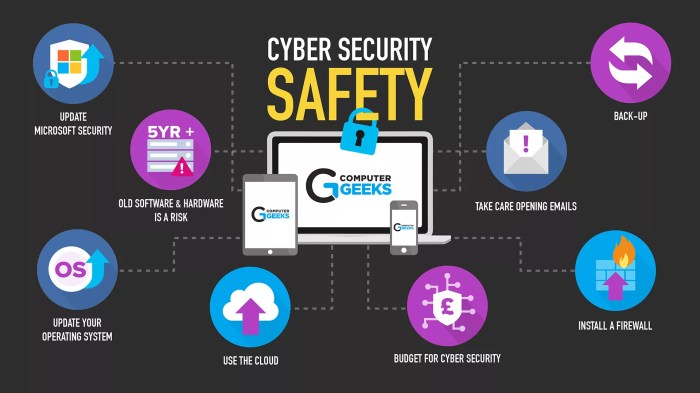How to protect your business from cyber threats is a crucial question for every entrepreneur and business owner. In today’s interconnected world, the risk of cyberattacks is ever-present, posing a significant threat to your data, reputation, and financial stability. This guide empowers you with the knowledge and strategies to build a robust cybersecurity defense, safeguarding your business from the ever-evolving landscape of online threats.
Understanding these threats and implementing proactive measures is not just about compliance; it’s about ensuring the long-term success and resilience of your business. Let’s embark on this journey together, transforming your understanding of cybersecurity and empowering you to protect what matters most.
This comprehensive guide will explore various types of cyber threats, from phishing scams and malware infections to ransomware attacks and data breaches. We will delve into practical strategies for implementing strong security measures, including password management, multi-factor authentication, and employee security awareness training. Furthermore, we will cover data protection and backup strategies, emphasizing the importance of data encryption and regular backups to ensure business continuity in the face of unforeseen events.
Finally, we’ll address network security, access control, and legal compliance considerations, equipping you with the tools and knowledge to navigate the complexities of cybersecurity and safeguard your business effectively.
Compliance and Legal Considerations: How To Protect Your Business From Cyber Threats

Navigating the complex landscape of data protection is crucial for any business, regardless of size. Robust security measures are not only vital for protecting your valuable assets but also for fulfilling your legal obligations. Understanding and adhering to relevant regulations is paramount to maintaining trust with customers and avoiding potentially crippling penalties.Protecting sensitive data is not just a technical challenge; it’s a legal imperative.
Failure to comply with data protection laws can lead to significant financial losses, reputational damage, and even criminal prosecution. Proactive compliance, therefore, is not just a good idea—it’s a necessity for long-term business sustainability and success.
Relevant Data Protection Regulations and Industry Standards
Numerous regulations and standards govern data protection, varying by industry and geographic location. Key examples include the General Data Protection Regulation (GDPR) in the European Union, the Health Insurance Portability and Accountability Act (HIPAA) in the United States for healthcare data, and the California Consumer Privacy Act (CCPA) in California. These regulations Artikel specific requirements for data collection, storage, processing, and security, emphasizing the rights of individuals regarding their personal data.
Understanding the specific regulations applicable to your business and industry is the first step towards effective compliance. For example, businesses operating within the EU must strictly adhere to GDPR’s stringent data protection standards, including obtaining explicit consent for data processing and providing mechanisms for data subject access requests. Failure to do so can result in substantial fines.
Legal Responsibilities of Businesses Regarding Data Security
Businesses have a legal responsibility to implement appropriate technical and organizational measures to protect personal data against unauthorized access, use, disclosure, alteration, or destruction. This includes conducting regular risk assessments, implementing robust security controls (such as encryption and access controls), and establishing data breach response plans. Legal responsibilities also extend to informing individuals about data breaches and cooperating with regulatory authorities in the event of an incident.
For instance, under GDPR, organizations must notify the relevant supervisory authority within 72 hours of becoming aware of a data breach. This demonstrates the critical need for proactive security measures and a well-defined incident response plan.
Best Practices for Meeting Compliance Requirements
Implementing a comprehensive data security program is key to meeting compliance requirements. This includes establishing a clear data governance framework, conducting regular security awareness training for employees, implementing strong access control measures, and regularly reviewing and updating security policies. Regular security audits and penetration testing can identify vulnerabilities before they are exploited. Data encryption, both in transit and at rest, is crucial for protecting sensitive information.
Furthermore, maintaining accurate records of data processing activities and implementing robust data breach response plans are essential for demonstrating compliance and mitigating potential damage. For example, a robust data loss prevention (DLP) system can prevent sensitive data from leaving the organization’s network unauthorized.
Implications of Non-Compliance, How to protect your business from cyber threats
Non-compliance with data protection regulations can have severe consequences. These can include substantial financial penalties, reputational damage, loss of customer trust, legal action from affected individuals, and even criminal prosecution. The severity of penalties can vary depending on the specific regulation and the nature of the violation. For instance, GDPR violations can result in fines of up to €20 million or 4% of annual global turnover, whichever is higher.
The damage to a company’s reputation can be equally devastating, leading to a loss of business and difficulty attracting investors. Therefore, proactive compliance is not just a legal requirement but a strategic imperative for long-term business success.
Protecting your business from cyber threats requires a proactive and multifaceted approach. By understanding the various types of threats, implementing strong security measures, prioritizing data protection, and staying informed about evolving best practices, you can significantly reduce your vulnerability to cyberattacks. Remember, cybersecurity is an ongoing process, not a one-time fix. Regularly reviewing and updating your security protocols, conducting employee training, and staying informed about emerging threats are crucial for maintaining a robust and resilient defense.
Embrace this journey of continuous improvement, and empower your business to thrive in the digital age with confidence and security.
Do not overlook explore the latest data about developing a strong brand identity for a digital marketing business.
Find out further about the benefits of how to handle difficult clients in a digital marketing agency that can provide significant benefits.